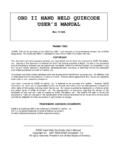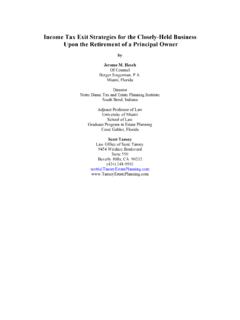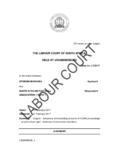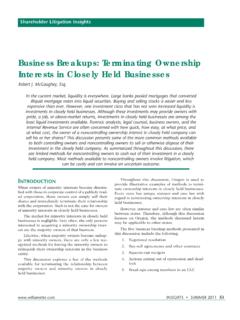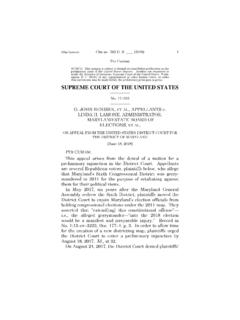Transcription of THE LABOUR COURT OF SOUTH AFRICA HELD AT …
1 Of interest to other judges THE LABOUR COURT OF SOUTH AFRICA held AT JOHANNESBURG Case no: JS 737/12 In the matter between: MAPULA IRENE SERONGWA Applicant and UNIVERSITY OF JOHANNESBURG Respondent Heard: 29 February to 2 March 2016 Delivered: 4 March Summary: (Automatically unfair dismissal absolution from the instance - existence of a dismissal) JUDGMENT LAGRANGE J Introduction [1] The applicant in this matter, Ms M Serongwa, referred an automatically unfair dismissal dispute to the COURT based on alleged racial discrimination. The respondent raised and in limine objection in the pleadings that she Page 2 was not dismissed but her contract of employment simply terminated. At the commencement of proceedings the parties indicated that they believed it would be necessary to hear evidence before it could be determined if she had been dismissed or that her contract had simply expired.
2 Evidence was led for two days and at the end of the applicant s evidence, when I queried whether the in limine point was being pursued, the respondent confirmed that it was and the respondent applied for absolution from the instance on the basis that the applicant had not made out a prima facie case of dismissal. [2] The parties then argued the issue and the matter was postponed until a ruling to be handed down on 4 March 2016, on the understanding that if absolution was not granted, further evidence in the matter would be led after an adjournment. The existence of a dismissal [3] The following facts are not in dispute: Since 2005, the applicant had been employed as a part-time lecturer on a number of 10 month contracts in an academic development unit. It emerged from the evidence that it was common cause that a new contract was entered into based on the number of students participating in the program and the availability of third-party funding.
3 In 2011, the applicant s fixed term contract expired on 30 November 2011 and she did not receive any salary after that date. However, before that date arrived, the applicant was subjected to a disciplinary enquiry relating to an email she had sent to a number of line managers on 15 August 2011 complaining of what she saw as the improper conduct of some of her colleagues. On 17 November 2011, the chairperson of the enquiry, Advocate M Phala, issued his findings on the charges, in terms of which he found the applicant guilty, and invited the parties to make representations on the issue of sanction. The applicant contended that she never received the findings until January 2012 and never had an opportunity to make representations on an appropriate sanction. The Page 3 employer however did make representations on 25 November 2011.
4 I note that the chairperson did record that the applicant s trade union representative at the time had advised the chairperson he had been admitted to hospital and asked for an opportunity to make representations but that by the time his recommendation on sanction was issued on 7 December 2011 no submissions on her behalf had been received from the union. The chairperson couched his conclusion on sanction as a recommendation when he handed it down but on 8 December 2011, he issued a letter on the University letterhead confirming the termination of the applicant s services from that date and advising her of a right of appeal. Although the chairperson was aware of the applicant s part-time status, there is no evidence on the face of his findings or reasons for the sanction that he knew her contract had already expired at the time he issued his sanction.
5 In her statement of claim, the applicant says that: she was dismissed following the disciplinary hearing, and since her contract had been renewed every year there was a reasonable expectation that it would be renewed at the end of each year. [4] Under cross-examination the applicant agreed that her contract ended on 30 November 2011. Evaluation [5] In De Klerk v Absa Bank Ltd and Others1 the SCA reiterated the test for absolution: [10] The correct approach to an absolution application is conveniently set out by Harms JA in Gordon Lloyd Page & Associates v Rivera and Another2001 (1) SA 88 (SCA) at 92E - 93A: 1 2003 (4) SA 315 (SCA) at 323. Page 4 '[2] The test for absolution to be applied by a trial COURT at the end of a plaintiff's case was formulated in Claude Neon Lights (SA) Ltd v Daniel1976 (4) SA 403 (A) at 409G - H in these terms: ''.
6 (W)hen absolution from the instance is sought at the close of plaintiff's case, the test to be applied is not whether the evidence led by plaintiff establishes what would finally be required to be established, but whether there is evidence upon which a COURT , applying its mind reasonably to such evidence, could or might (not should, nor ought to) find for the plaintiff. (Gascoyne v Paul and Hunter 1917 TPD 170 at 173; Ruto Flour Mills (Pty) Ltd v Adelson (2)1958 (4) SA 307 (T).)'' This implies that a plaintiff has to make out a prima facie case - in the sense that there is evidence relating to all the elements of the claim - to survive absolution because without such evidence no COURT could find for the plaintiff (Marine & Trade Insurance Co Ltd v Van der Schyff 1972 (1) SA 26 (A) at 37G - 38A; Schmidt Bewysreg 4th ed at 91 - 2).
7 As far as inferences from the evidence are concerned, the inference relied upon by the plaintiff must be a reasonable one, not the only reasonable one (Schmidt at 93). The test has from time to time been formulated in different terms, especially it has been said that the COURT must consider whether there is ''evidence upon which a reasonable man might find for the plaintiff'' (Gascoyne (loc cit)) - a test which had its origin in jury trials when the ''reasonable man'' was a reasonable member of the jury (Ruto Flour Mills). Such a formulation tends to cloud the issue. The COURT ought not to be concerned with what someone else might think; it should rather be concerned with its own judgment and not that of another ''reasonable'' person or COURT . Having said this, absolution at the end of a plaintiff's case, in the ordinary course of events, will nevertheless be granted sparingly but when the occasion arises, a COURT should order it in the interests of justice.
8 ' [6] The nub of the issue is whether the applicant has made out a prima facie case that she was dismissed by virtue of the letter of 8 December or that she was dismissed within the meaning of s 186 of the LRA. The respondent contends that the applicant never pleaded that her dismissal arose out of s 186 so that alternative argument is not available to her. Page 5 Dismissal on 8 December 2011 [7] At the time of the enquiry, it is probably true that both parties understood that the applicant s employment had been terminated by virtue of the dismissal letter of 8 December 2011. The difficulty, as a matter of law is that, when the letter purporting to dismiss the applicant was issued, she was no longer employed by the respondent, because her service ended by operation of her contract on 30 November. Accordingly, despite outward appearances, the letter had no legal effect whatsoever in determining the termination of her employment.
9 An employer cannot dismiss someone who is no longer in its employment. [8] Mr Kubayi appearing for the applicant ventured to argue that the employer could not now say that the purported dismissal was not the actual termination of the applicant s services. Although the applicant never pleaded that the employer was bound by its representation that it had dismissed her, even if this argument could be raised, it faces two hurdles. Firstly, the purported dismissal took place at a time when there was no employment relationship so it could never have been a legally competent action by the respondent. Secondly, in so far as the applicant is raising an argument based on estoppel, the difficulty she has is that, estoppel can only be raised as a defence and not a cause of Dismissal by virtue of s 186 [9] S 186 of the LRA states, inter alia: (1) 'Dismissal' means that- (a).
10 ; (b) an employee reasonably expected the employer to renew a fixed term contract of employment on the same or similar terms but the employer offered to renew it on less favourable terms, or did not renew it. [10] As mentioned, the respondent contends that this alternative basis for claiming dismissal was not pleaded, because the applicant relied on the letter of 8 December 2012 as the event which constituted the dismissal. 2 De Klerk v Old Mutual Insurance Co Ltd 1990 (3) SA 34 (E) at 41D-H Page 6 However, even if s186 could be invoked in the determination of the dismissal, I am not satisfied the applicant has laid a basis for this. [11] Firstly, the applicant s evidence did not deal with her expectation of continued employment on a new contract. Secondly, if the dismissal occurred as a result of the non-renewal of the contract, the applicant would not have relied on the date she received the notice of dismissal as the date of dismissal.










